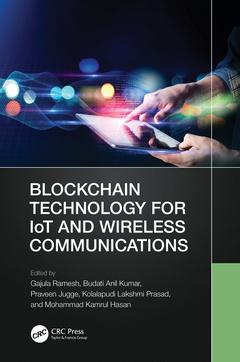Blockchain Technology for IoT and Wireless Communications
Coordonnateurs : Ramesh Gajula, Kumar Budati Anil, Jugge Praveen, Prasad Kolalapudi Lakshmi, Hasan Mohammad Kamrul

Smart communications are the concept in which smart appliances and devices are integrated into an application that runs in a smart hand-held device. The residents of a smart home can have complete control over their home?s electronic gadgets using wireless communications. These technologies can help people control gadgets in the home/office remotely and often simultaneously, which increases convenience and reduces time spent on these tasks. However, problems can arise in the security systems associated with these smart devices; security may be compromised when there are loopholes or human mistakes. When security credentials are lost, overall security can also be lost. This is because smart technology is made up of plenty of devices that are integrated with Internet of Things (IoT) technology and the cloud. This environment can introduce many security issues, as discussed in this text. Blockchain is a promising technology that operates in a decentralized environment to protect devices and the data collected by devices from security and privacy issues by using wireless communication technology. Blockchain-enabled IoT can be used to achieve end-to-end security. Blockchain technology is already used in wireless sensor/communication networks to estimate and predict house data and civil structures.
IoT-integrated innovative applications like smart homes present unique security and privacy challenges. Scalability is the main problem as the current centralized IoT platforms have message routing mechanisms that create a bottleneck in scaling up too many devices used in IoT. As many devices are participating in generating data, such a setup may also be subjected to Distributed Denial of Service (DDoS) attacks. Lack of data standards is another cause of concern as it leads to interoperability problems. Blockchain technology for IoT and wireless communications offers a promising solution for smart devices. These technologies can provide end-to-end security and overcome the aforementioned problems. The usage of open-standard distributed IoT solutions can solve many problems that are associated with centralized approaches. Blockchain technology is nothing but a distributed ledger of transactions. It offers direct communication to connected devices. Such devices collect data, and all legitimate participants can access said data. Thus, decentralized blockchain networks can provide improved security for IoT-based solutions.
1. Improving IoT Security Using Blockchain, 2. Block Chain-Based Secure Big Data Storage on the Cloud, 3. Hyper Ledger Fabric Blockchain for Data Security in IoT Devices, 4. IoT-Based Concentrated Photovoltaic Solar System, 5. Design and Implementation of an IoT-Integrated Smart Home System with End-to-End Security Using Blockchain Technology, 6. IoT-Based Robotic Arm, 7. Assimilation of Blockchain for Augmenting the Security and Coziness of an IoT-Based Smart Home, 8. Anti-Theft Fingerprint Security System for Motor Vehicles, 9. Soft Sensor-Based Remote Monitoring System for Industrial Environments, 10. The Impact of Internet of Things on Measurement, Monitoring of Power System Parameters in an LFC-DR Model, 11. IoT-Based Infant Cradle Monitoring System
Dr. G. Ramesh received a Ph.D. degree in Computer Science and Engineering from JNT University Anantapur, Ananthapuaramu, Andhra Pradesh in 2018, and M.Tech. Degree from the JNTUA College of Engineering, Ananthapuramu, in 2009. He is currently working as a Associate Professor at CSE Department, Gokaraju Rangaraju Institute of Engineering & Technology (Autonomous), Hyderabad- 500090, Telangana State, India. He has more than 11 years of experience in teaching and 6 years of experience in research. Besides, he has published 35 research articles in leading journals (SCI, SCOPUS & DBLP), conference proceedings, 1 text book and 3 international book chapters. He is having 78 citations with an h-index 4 for his research publications. He is the reviewer for reputed International Conferences. He has organized & attended various FDPs and Conferences/workshops. He also worked as Coordinator for conducting course "Database Application Software and Database Design", for UG and PG students of JNTUA CE, Ananthapuramu in collaboration with Electronic and ICT Academy, NIT Warangal and IIT Madras, Chennai. His current research interests include Software Engineering, Machine Learning, Image Processing and Big Data Analytics.
Dr. Budati Anil Kumar received a Ph.D. Degree in Electronics and Communication Engineering from GITAM Deemed to be University, Hyderabad in 2019, and M.Tech. Degree from the LBRCE (JNTUK Kakinada), Mylavaram in 2010. B.Tech Degree from VYCET (JNTU Hyderabad), Chirala in 2007. He is currently working as an Associate Professor in ECE Department, Koneru Lakshmaiah Education Foundation, Hyderabad, India-500075, Telangana State, India. He has more than 13 years of experience in teaching and six years of experience in research. Besides, he has published 50 research articles in highly reputed publisher journals and conferences whose indexing in SCIE, SCOPUS, etc. He acts as Guest Editor for Peer-to-Peer Networking Journal (Springer Pu
Date de parution : 09-2023
15.6x23.4 cm
Thèmes de Blockchain Technology for IoT and Wireless Communications :
Mots-clés :
blockchain technology; IoT; wireless communication; smart homes; DDoS Attacks; IoT security; house data prediction; smart communications; IoT Device; Arduino UNO; UNO; LCD; MCU; Smart Home; IoT Application; Smart Contracts; MQTT; LCD Display; Rest; Servo Motor; Arduino Digital Pin; VCC; Robotic Arm; Sg; DR Control; Fingerprint Sensor; Smart Home System; Bluetooth Module; Flame Sensor; Android Application; Wi-Fi Module



